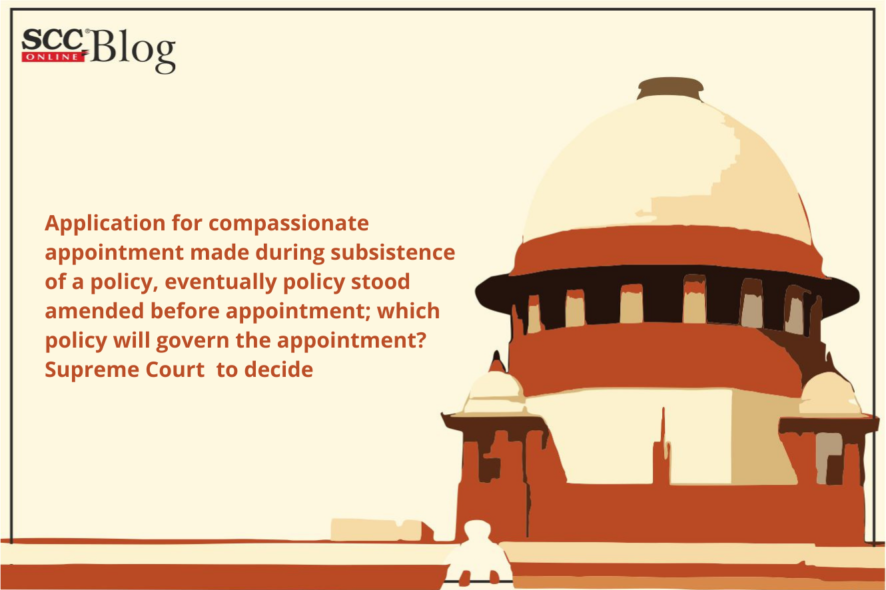Supreme Court: While addressing a case raising significant question of law on principles governing compassionate appointment, the Division Bench of D.Y. Chandradhud and Hima Kohli, JJ., issued notice to M.P. Government.
The genesis of the case were that the petitioner’s father, who was working as Process Writer in District Court establishment had preferred an application seeking voluntary retirement on medical grounds. An application was also preferred to provide compassionate appointment to the petitioner as per circular of General Administration Department (GAD) dated 10-06-1994; i.e. Scheme of Compassionate Appointment.
Chronology of Events
The chronological dates of events which lead to instant appeal were as follows:
- 06-12-1994: The father of the petitioner preferred an application for compassionate appointment.
- 03-01-1995: The scheme of compassionate appointment stood withdrawn/amended.
- 09-03-1995: The petitioner was appointed on compassionate grounds.
Termination of the Petitioner
In the furtherance of M.P. High Court’s directions issued in Mansukh Lal Saraf v. Arun Kumar Tiwari, 2015 SCC Online MP 7435, which was upheld by the Supreme Court in M.P. Nagar Nigam v. Mansukh Lal Saraf, (2020) 18 SCC 606, the State government had examined validity of the petitioner’s appointment.
Resultantly, petitioner was put to notice by the District Court establishment and; in turn, he filed his response. The State opined that the circular dated 10-06-1994 which permitted appointment of petitioner on the ground of voluntary retirement of his father, stood withdrawn/cancelled much before the date of his appointment, hence a termination order was issued against the petitioner declaring his appointment as illegal.
Findings of the High Court
The M.P. High Court observed that compassionate appointment can be made provided there exists an enabling policy/provision and that there is no unfettered or unlimited discretion with the employer to appoint anybody on compassionate basis unless there exists a provision for such appointment.
The High Court opined that though the circular dated 10-06-1994 provided for appointment on compassionate basis, the said circular stood withdrawn when the petitioner’s appointment order was issued. Thus, the Court held that on the date of appointment of petitioner, there was no enabling provision in existence on the strength of which such appointment order could have been issued and in absence of any such enabling provision, the appointment of petitioner could not be treated as “irregular” appointment rather it was an “illegal appointment”. Hence, the High Court had upheld government’s decision to terminate the petitioner from service.
Question of Law
Whether compassionate appointment will be governed by the appointment scheme as it stood on the date of application for appointment or the scheme which prevailed on the date of appointment?
Grievances of the Petitioner
The petitioner submitted that though the scheme was withdrawn/amended vide the new scheme dated 03-01-1995, his application/process for appointment under the earlier scheme was already processed by the State and he was appointed vide Order dated 09-03-1995. Hence, the petitioner had challenged the termination order stating that he had served more than 22 years of continuous and uninterrupted service and his service could not be termed as illegal owing to the facts that on the date of application of appointment the scheme in question (Circular dated 10-06-1994) was very much applicable.
The petitioner contended that the High Court had failed to take note that, the application for appointment was based on the old scheme and the new scheme only came into effect the after application was submitted. Further, the Petitioner was never asked to reapply or the application was not rejected during interview process; rather he was appointed.
Reliance was placed by the petitioner on SBI v. Jaspal Kaur, (2007) 9 SCC 571, to contend that an administrative or executive order cannot have retrospective effect so as to take away the right accrued/vested right available to the Petitioners/employees. Therefore, the petitioner argued that the Circular dated 03-01-1995 (new scheme) will have no applicability in his case since it is trite in law that every order/scheme/policy decision shall apply prospectively and not retrospectively.
Conclusion
In the Backdrop of above, the Court had issued notice to the State government. Additionally, the recovery initiated against the petitioner pursuant to the impugned order of the High Court was also stayed by the Court.
Evidently, a case on the similar question of law had been referred to be adjudged by a larger Bench of the Supreme Court in SBI v. Sheo Shankar Tiwari, (2019) 5 SCC 600, wherein the Bench had opined that principles emanating judicial precedents are not consistent and do not reconcile.
[Rakesh Dubey v. District & Session Judge, Jabalpur, 2022 SCC OnLine SC 582, order dated 29-04-2022]
Appearance by:
For the Petitioner: AOR Swarnendu Chatterjee, Senior Advocate Siddharth Bhatnagar, Advocate Himanshu Nailwal, Advocate Ambuj Tiwari, Advocate Pracheta Kar, Advocate Aditya Sidhra and Advocate Nadeem Afroz






